CAN GAY COUPLES BE BLESSED IN A CATHOLIC CHURCH? IN PUBLIC? WITH FAMILY AND FRIENDS?
Follow Up on the Vatican's Declaration on the Blessing of Gay Couples
A number of people have asked me some really interesting questions about the Vatican statement on blessing gay couples, and about a story that appeared last night in the New York Times about Fr. Jim Martin blessing a queer couple in the living room of the Jesuit community in which he lives.
(Congratulations Jason and Damian!)
It’s all very much the earliest of early days about all this. But here’s a couple initial thoughts.
I saw in the article in the New York Times that Fr. Martin blessed a gay couple in a living room. Can a blessing like this take place inside a church or other religious location, or is that prohibited?
The Declaration does offer a few prohibitions about the context within which a blessing may occur. But none of these have anything to do with the actual setting.
Here’s the text: “This blessing should never be imparted in concurrence with the ceremonies of a civil union, and not even in connection with them. Nor can it be performed with any clothing, gestures, or words that are proper to a wedding.”
While the Declaration does not mention churches explicitly, it does give as examples of places where a blessing can take place a shrine, in a prayer group or on a pilgrimage, all of which are explicitly religious settings.
So I would say yes, a queer couple could certainly have this blessing in their parish church. (Honestly, it seems to me it would be super weird to say gay couples can ask for a blessing, but not in a church.)
Does the blessing have to be in private?
There’s nothing in the Declaration that suggests other people cannot be present for this blessing. In fact the document’s examples of where such an event might take place include public settings and events where other people are present.
The Declaration is very anxious that this blessing not be mistaken for a liturgical ceremony (aka a wedding), which could lead some to argue only a small number of people should be present at a blessing.
But the restrictions it places on the event seem to rest entirely with the clergy, i.e. what they should and shouldn’t say and do. (Some might argue that the clothing restriction applies to the couple, too, but I think that’s unlikely. If you’re going to tell two people that dress up for church on Sunday or just in general that they can’t dress up them for this, it will descend into silliness pretty quickly.)
I’d say that any interpretation which insists that such a blessing can only be done in private risks turning what is clearly meant to be a good and strengthening thing for queer people into another experience of the Church shaming and closeting them. And that’s no good.
It also risks limiting the breadth of the grace that this moment has to offer. The Declaration ends with this beautiful paragraph, which begins with a quote from Francis:
“This world needs blessings, and we can give blessings and receive blessings. The Father loves us, and the only thing that remains for us is the joy of blessing him, and the joy of thanking him, and of learning from him […] to bless.” In this way, every brother and every sister will be able to feel that, in the Church, they are always pilgrims, always beggars, always loved, and, despite everything, always blessed.
That ending is important: A blessing on any of us is meant to help the whole community feel like pilgrims on the way, in need, loved and blessed.
Can any priest or deacon do a blessing like this?
Absolutely. No priest or deacon is required to do such a blessing (and honestly, why would you want to ask someone to do it who didn’t want to). But any ordained mininster can choose to do such a blessing if requested.
Do priests or deacons require permission from a bishop or superior to do these blessings?
No. It’s considered part of the ordinary ministry of an ordained minister.
Can a bishop or religious superior prohibit this practice in their diocese?
It does not seem so. The Declaration includes this statement, which I take to mean the Vatican feels the matter is settled and there’s nothing more to be said:
What has been said in this Declaration regarding the blessings of same-sex couples is sufficient to guide the prudent and fatherly discernment of ordained ministers in this regard. Thus, beyond the guidance provided above, no further responses should be expected about possible ways to regulate details or practicalities regarding blessings of this type.
But could a bishop or superior say this cannot take place in their churches, or put other restrictions on the practice? Wait and see…
Is the prayer Fr. Martin used to bless the couple in the New York Times the prayer that has to be used?
No. In fact, as part of its concern that this not look like an official wedding-like ritual, the Declaration makes it clear that there should be no one format to this, or any one prayer. It’s meant to be a “simple gesture” and “spontaneous” (i.e. not an elaborate formalized ritual). So priests and deacons should do what feels appropriate in the moment for this couple.
The only greater specificity the document gives is to say that such a “spontaneous blessing” could be preceded by “a brief prayer [in which]…the ordained minister could ask that the individuals have peace, health, a spirit of patience, dialogue, and mutual assistance—but also God’s light and strength to be able to fulfill his will completely.”
Could there be a song after the blessing, or some quiet time for reflection? Nothing about that screams “wedding” or even “liturgy” to me. But again, every ordained minister is meant to rely on their own prudent judgment.
Does this new statement allow the minister to bless the marriage or just the couple?
The original question put to Pope Francis that led to all of this was about whether “the widespread practice of blessing same-sex unions is in accordance with Revelation and the Magisterium.” So that seems to say the issue at hand is here the blessing of same-sex unions.
But the way that Francis responds focuses not on the union but on the couple, after saying very clearly that “only the union” between a man and a woman open to procreation “can be called ‘marriage.’”
In the Declaration we’re likewise told “There is no intention to legitimize anything” with this blessing, “but rather to open one’s life to God, to ask for his help to live better, and also to invoke the Holy Spirit so that the values of the Gospel may be lived with greater faithfulness.” So again, that’s about the couple.
Except the couple is coming to the priest or deacon specifically as married people wanting their relationship blessed. And what could “live better” or “live the values of the Gospel with greater faithfulness” mean in this context other than “help them to be more loving and generous in their relationship”?
The only other option I see is “Help them figure out that they shouldn’t be married to another person of the same sex,” which would be crazy.
And so I think the actual answer has to be both. It’s about strengthening them and their relationship, so that their relationship may be a real source of blessing for others.
This could be interpreted as the Church saying, We may not agree with your relationship, but if you’re going to do it anyway we want you to be as happy in it and as good for others as you can be.
Another interpretation, which I think is closer to Francis’ thinking, actually takes the Church out of the equation entirely. “God never turns away anyone who approaches him!” the Declaration states at one point. At another it writes, “The request for a blessing…is a seed of the Holy Spirit that must be nurtured, not hindered.” And at another, “It is God who blesses.”
All of which is to say, Hey Church, this is not about you and what you think of gay marriage. This is about God and God’s people. So get out of the way and let that connection happen.
So is the church now saying it’s okay to love other people of your gender, but it’s not okay to marry?
I think the official answer would be, Neither.
What the Declaration is saying is that God loves queer people (and other people in irregular situations) and wants to support them and their relationships.
In a sense—and this is very Francis—this document is saying the focus on sex and marriage completely misses the point, which is that God never turns anyone away. That’s the only thing that matters here, and that’s what the Church should be reflecting.
But having said that, as I wrote yesterday, I think in practice that the experience of this blessing may very feel like a validation of commitment both for the couple and those who witness it. And at some point that’s not really avoidable. The Holy Spirit’s gonna blow where it’s gonna blow. And the Church’s job is to pay attention to it.
Is this actually such a good thing?
I had a long conversation with a friend who isn’t Catholic about this today. He pointed out, Gay marriage is the law of the land. So why are Catholics so happy about something that is so so much less than that?
Former Catholic Matt Cain wrote about this even more powerfully in the Guardian.
It never occurred to me that one day I’d be able to get married. It never occurred to me that I’d even be happy or find love. I thought my future was to be lonely and die of AIDS, which, I heard at school, was God’s punishment for gay men. Gay men were defined by what we did in bed, not by who we loved. As you would often hear in those days, “Queers can’t love.” I would pray to God to stop me from being gay.
It’s because of this that it took me till my 40s to find love. I spent years engaged in self-destruction, smothering my shame with casual sex, booze and partying, behaving exactly as the homophobes had told me I would.
…Now, [the Church] grudgingly offers to “bless” unions that it explicitly cannot “approve” of. It’s almost hilariously hypocritical.
I think they raise important points. Just consider how much of what I’ve written above is about the Church wanting to make it clear, This is not a validation of a marriage. It’s a lot, and at some point it’s a lot to take, too.
Perhaps we Catholics have all lived so long with such persistently awful teaching about queer people and women that we end up getting excited about what are basically bread crumbs (if that).
And certainly if the prevailing interpretation of this text becomes that queer people can get blessed but only more or less in secret (i.e. a closet…), it’s a no for me, thanks.
As I sit with all this, I find myself moving back and forth between two conversations. The first is one I had a few weeks ago with Frank DeBernardo, director of New Ways Ministry (who issued a statement about the Declaration on Monday.)
His description of how change happens in the church gives me hope that this could lead to really good things:
Aristotle says, First you have changes in behavior at the level of the grassroots, the people. Then you have what Aristotle calls the praisers and blamers in society, the ones who look at this and say what this group is doing is good, what that group is doing is bad.
And then you have the philosophers, who codify the praising and the blaming into principles. And then the people follow those principles, but they follow them by putting them into practice in real-life situations, and the cycle begins again.
So it’s action, praising and blaming, principles, which become justification for new action in particular situations.
I think that church teaching follows practice, rather than practices following church teaching. This document doesn’t make a universal allowance, but it is a justification for those who do want to include transgender people in these ways. And so it’s going to allow practice to happen.
To me the praisers and the blamers are the theologians of the church. So we’re going to see transgender people being godparents, and theologians are going to reflect on that, and some are going to say what’s good about it, and some are going to say what’s bad about it, and from that theological discussion, teaching will change. When change in practice happens, change in teaching is going to follow.
We’ve got a new practice which will have lots of different interpreatations, which will then lead to further reflection and change, hopefully for the better!
And on the other hand, I think of Bill Glenn, the former Jesuit, who told me about what it’s been like going to the Episcopal Church:
Partially it’s different because everyone is there by free choice. No one has to be there, no one has any sense of obligation to be there. So the community is there because they want something. There’s no remnant of Have-To.
And because they’ve done a lot of work in the last 50 years, there’s nothing in the polity of the Episcopal Church now that says to anyone, We accept you, but you’re not full members. Everyone is welcome in every ministry and at all tables. That’s very freeing. I didn’t know how freeing until I experienced it.
I talked at Mass last Sunday and I’m preaching at the first Sunday of Advent, and it’s total freedom for me. Because I feel the man I am is who they are inviting to minister, not a version of the man I am or the closeted version or the version that’s also required to uphold dogmatic truths that I don’t believe in.
Is this change in practice going to be enough to get the Church to a place where it fully recognizes queer people and their relationships? Wouldn’t it be easier to just finally say, Being queer is fine, rather than sort-of-kind-of-but-not-fully back into it like this? (God yes, 1000 times yes.) Do Catholics really just have Stockholm Syndrome?
Those are real questions, I think, ones every Catholic has to answer.
I promise that’s the last of me bombarding you with material about the Declaration. If you’re interested in more (and likely better!) coverage, I highly recommend the work my old colleagues like Mike O’Loughlin, Colleen Dulle and Gerry O’Connell are doing over at America.
I also think this conversation with theologians from Aleja Hertzler-McCain at NCR has a lot of important, thoughtful material to chew on.
Thanks and welcome to those who have subscribed the last few days. And to those who haven’t, maybe ‘tis the season? :) Come Wow with us!
Speaking of which, I’m super excited for the interview I’ve got for subscribers tomorrow with Kelly Younger, whose movie Candy Cane Lane is the number one film on Amazon Prime and includes mean elves, silly Christmas decorations, a kid playing hip hop tuba (and killing it), and a great family dynamic at its core.
See you then!

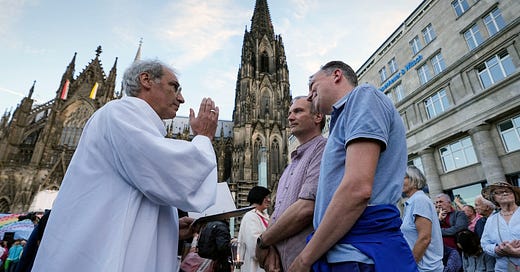


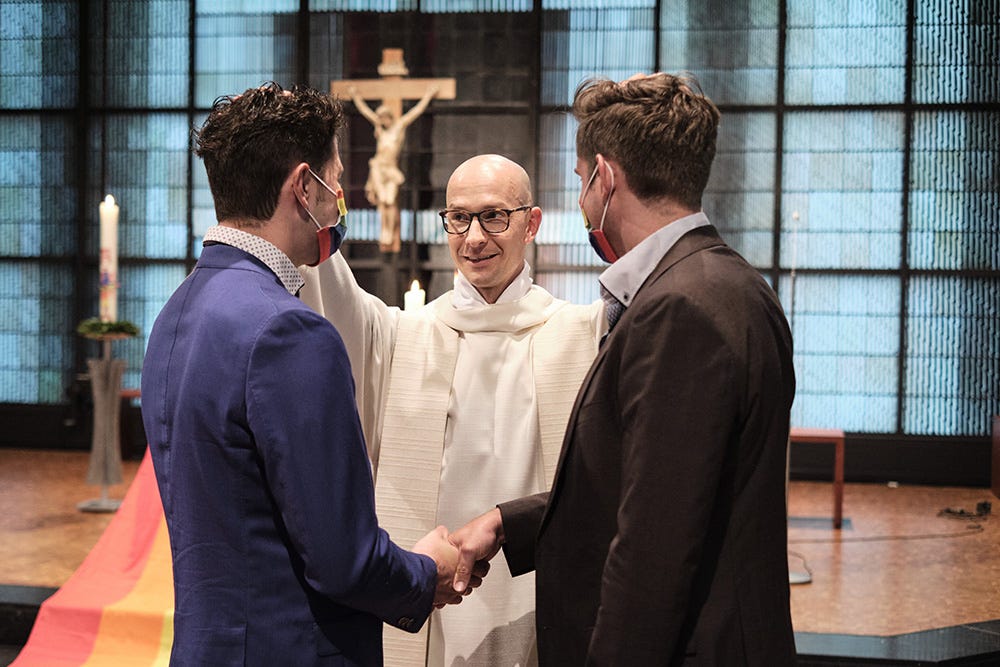
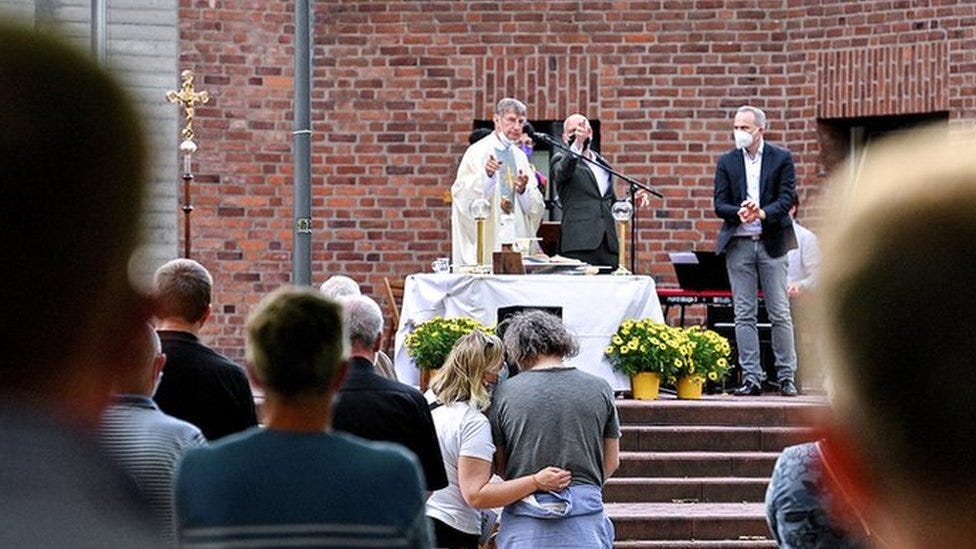
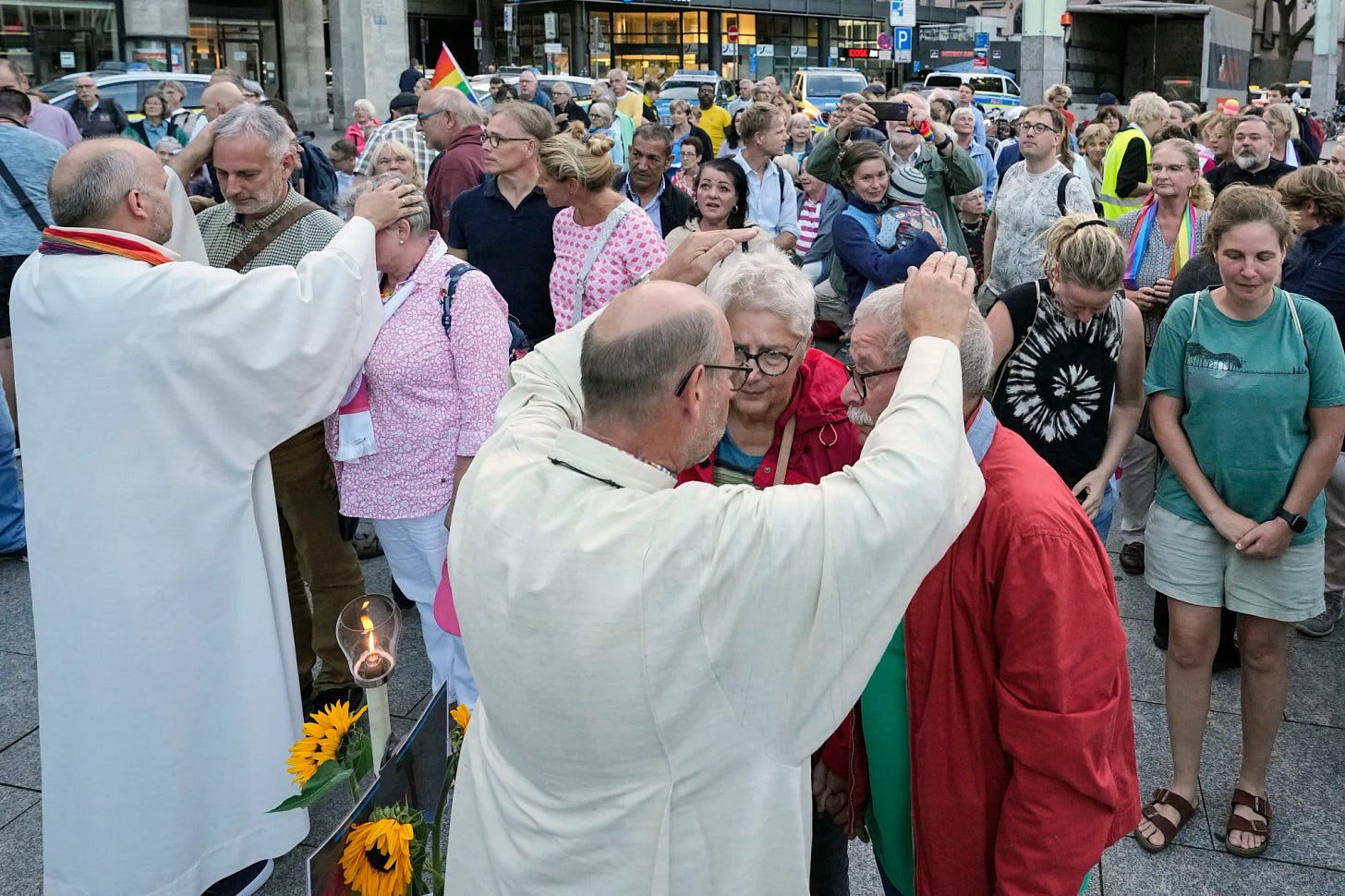
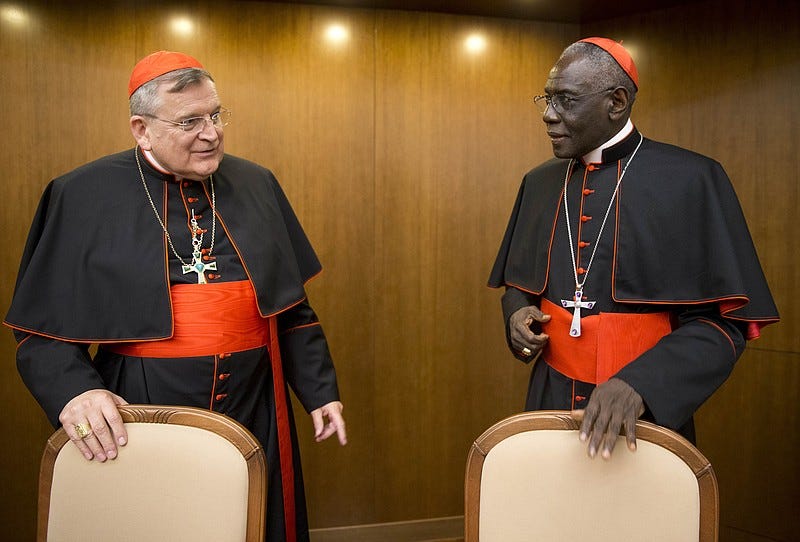
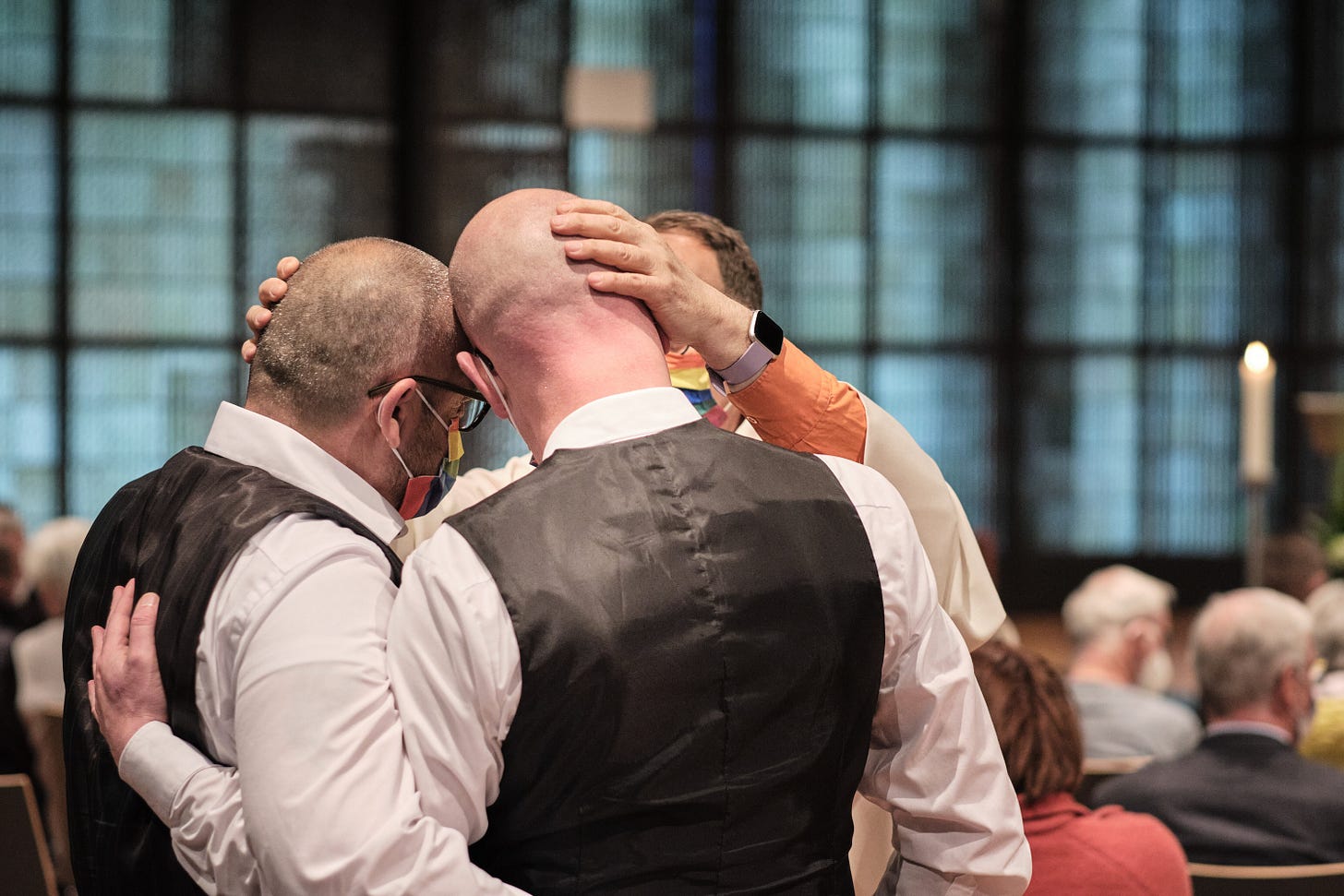
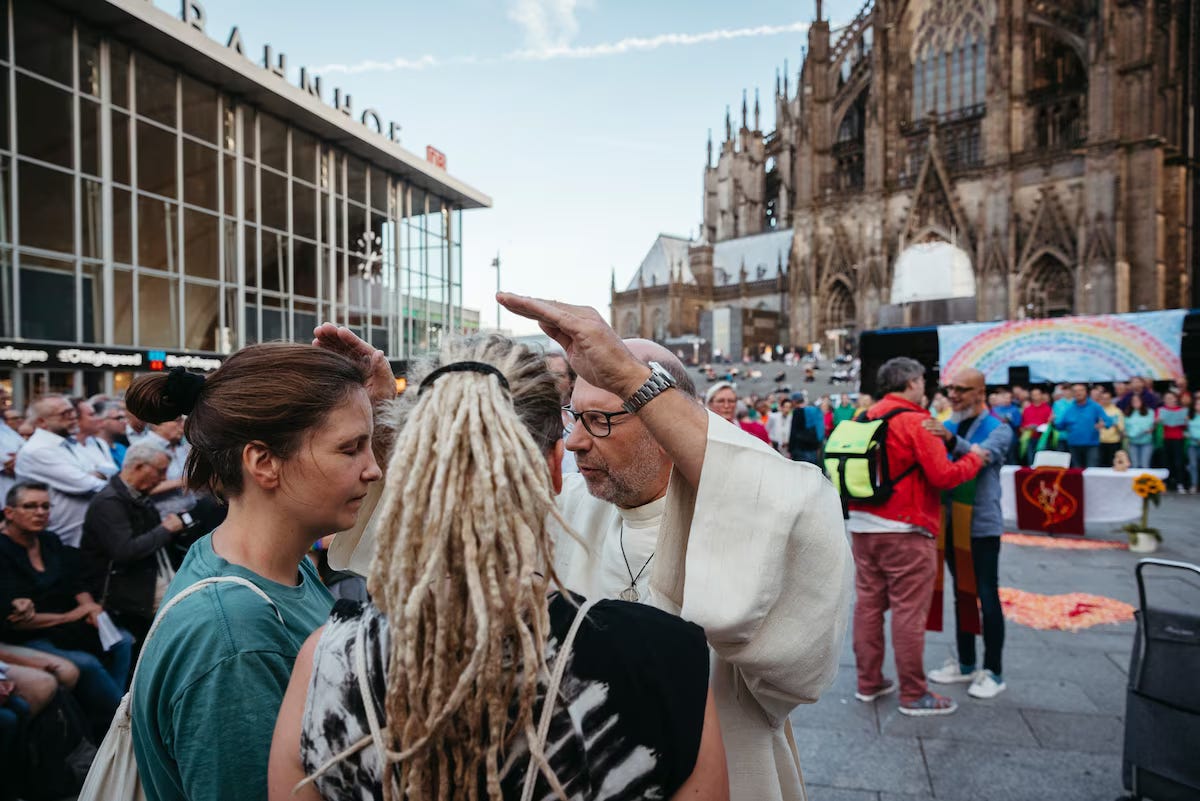
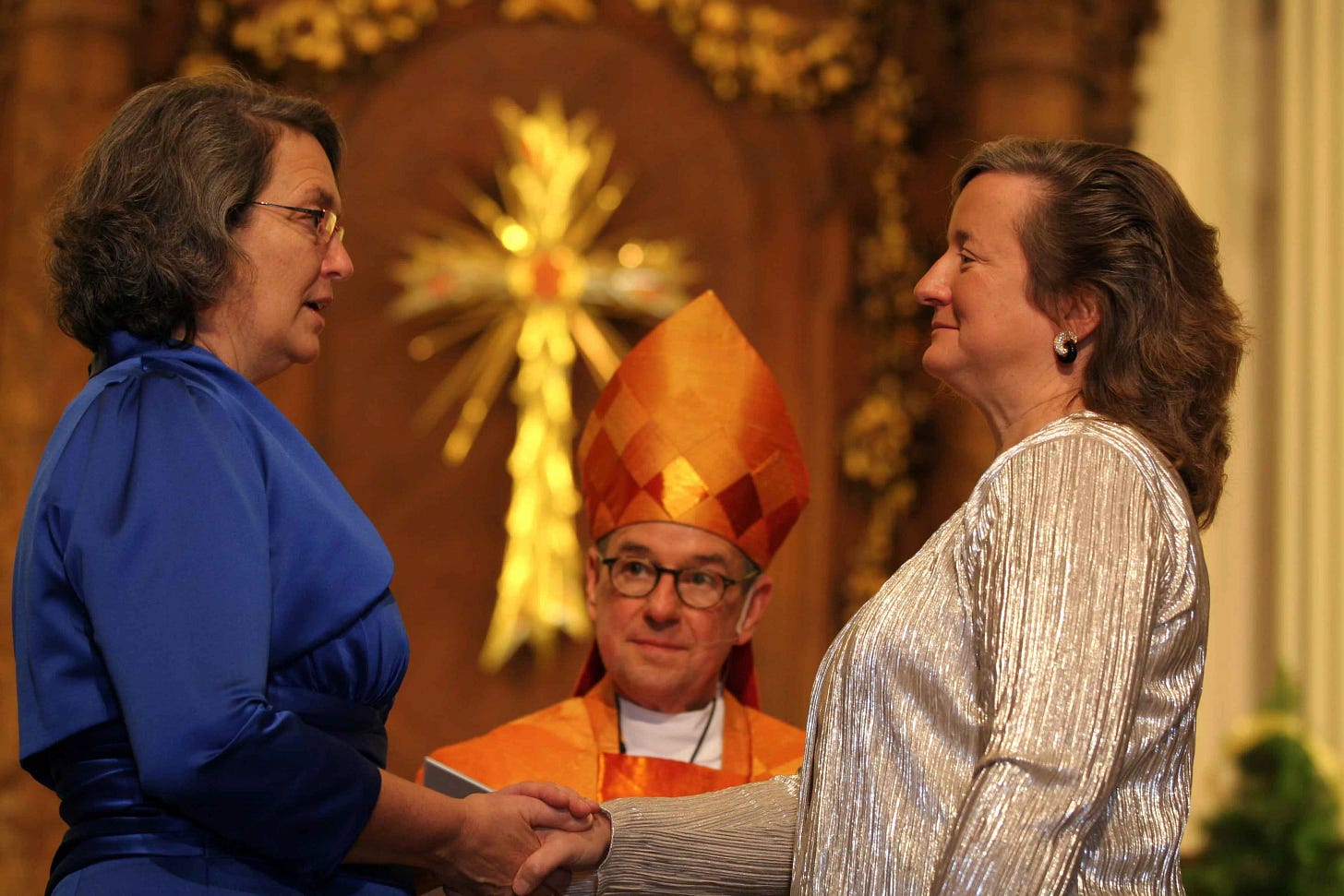
Jim this is really helpful, thank you for writing this!
You are, as always, in the forefront, Jim. I was so moved to see Jason and Damian receiving this blessing on day one!